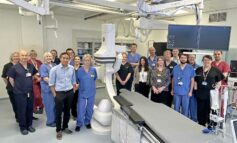The NHS in Bath, Swindon and Wiltshire is raising awareness about the importance of screening for bowel cancer throughout April, in support of Bowel Cancer Awareness month.

Last year, just 60 per cent of eligible residents took up the offer and returned their sample kit for testing.
In the UK, from the age of 60 until your 74th birthday, a bowel screening kit is sent to your home automatically every two years.
You don’t need to have experienced any symptoms of bowel cancer; the test picks up early signs of cancer that may otherwise go undetected. It is this early diagnosis that has proven to be the life-saving key to bowel cancer treatment.
Treatment for early signs of bowel cancer has been very effective, but there is still a long way to go.
With 77,000 people in Bath, Swindon and Wiltshire eligible for this test, the local NHS is encouraging you to consider the potential benefits of returning your sample sooner, rather than later.
Most people will carry out the test, return their sample in the post and within two weeks be told that there were no signs detected. It will be another two years before you are asked to carry out the test again.
For others however, the test may find blood in the sample in which case, you will be invited to a local screening centre to talk about your results.
This does not mean you definitely have cancer; the bleeding could be caused by a non-cancerous growth or another health problem. You will be offered more tests to find out what is causing the bleeding.
Dr Ardiana Gjini, Consultant in Public Health Medicine and Screening and Immunisation Lead for NHS England South (South Central) covering Bath, Swindon and Wiltshire said: “We don’t like to talk about our poo and bowel movements and some people may find this particular test unpleasant to perform, but my message to anyone who receives a test kit in the post is that cancer is so much harder to treat if we don’t catch it early.
“Difficult as it may be, completing the sample could quite simply save your life.
“As with all screening offered by the NHS, it is completely up to you if you wish to take part or not. As a health professional, I would ask you to consider the risks and the benefits and then decide what is right for you and your family.
“Cancer treatment can be very effective with more people surviving cancer than ever before and much of this is thanks to the screening programmes on offer.”
There are other things you can also do to reduce your risk of cancer, such as eating healthily, taking regular exercise, giving up smoking and generally monitoring your health and wellbeing, spotting when something is different and being aware of the possible signs and symptoms of cancer.



